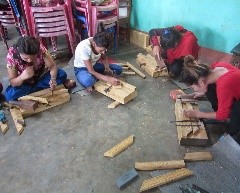Project background: Building on the work of the National Forest Programme (NFP) and the Growing Forest Partnership (GFP), a new global initiative called the Forest and Farm Facility (FFF) is being implemented jointly by IUCN, the Food and Agriculture Organization of the United Nations (FAO), and the World Bank. Funded through multiple agencies, FFF will be executed in 36 countries across the world. Currently, FFF is being implemented in ten countries within Africa, Asia and Latin America.
FFF promotes cross-sectoral coordination and enhances the organisation and capacity of local people for forest and farm community’s advocacy, livelihoods, and sustainable landscape management. The purpose of the programme is to increase the household income of smallholder, women, local community and indigenous peoples groups by improving the management of forest and farm resources, while also strengthening their capacity in policy engagement. The long-term goal of the project is to contribute to improving food security and livelihoods of the local people. In Nepal, IUCN is coordinating the FFF programme at the national level and Federation of Community Forestry Users Nepal (FECOFUN) and Federation of Nepal Cottage and Small Industries (FNCSI) is coordinating this programme at the district and local level.
Objectives of the project: The programme is aimed at improving livelihoods and decision-making related to forest and farm landscapes of smallholders, local communities and Indigenous peoples groups. Specifically, the objectives are:
• Strengthen smallholder, women, community and Indigenous peoples’ capacity in business, livelihood activities and policy engagement
• Catalyse multi-sectorial stakeholder policy platforms with governments at local and national levels
• Link local voices and learning to global processes through communications and information dissemination
Expected Outputs: The FFF programme has three components, namely policy advocacy, business development and promotion of a cross-sectoral platform. The expected major outcomes of the programme are as follows:
• Establishing and strengthening a system of multi-stakeholder policy dialogue
• Enhancing resource accessing capacity of producer organisations
• Strengthening the service delivery capacity of service providers
• Forming and strengthening the cross-sectoral platform
• Increasing income from forest and farm products
Donors: Government of Finland; Government of Germany; Government of Sweden; Government of the United States; and Agricord
Project background: Building on the work of the National Forest Programme (NFP) and the Growing Forest Partnership (GFP), a new global initiative called the Forest and Farm Facility (FFF) is being implemented jointly by IUCN, the Food and Agriculture Organization of the United Nations (FAO), and the World Bank. Funded through multiple agencies, FFF will be executed in 36 countries across the world. Currently, FFF is being implemented in ten countries within Africa, Asia and Latin America.
FFF promotes cross-sectoral coordination and enhances the organisation and capacity of local people for forest and farm community’s advocacy, livelihoods, and sustainable landscape management. The purpose of the programme is to increase the household income of smallholder, women, local community and indigenous peoples groups by improving the management of forest and farm resources, while also strengthening their capacity in policy engagement. The long-term goal of the project is to contribute to improving food security and livelihoods of the local people. In Nepal, IUCN is coordinating the FFF programme at the national level and Federation of Community Forestry Users Nepal (FECOFUN) and Federation of Nepal Cottage and Small Industries (FNCSI) is coordinating this programme at the district and local level.
Objectives of the project: The programme is aimed at improving livelihoods and decision-making related to forest and farm landscapes of smallholders, local communities and Indigenous peoples groups. Specifically, the objectives are:
• Strengthen smallholder, women, community and Indigenous peoples’ capacity in business, livelihood activities and policy engagement
• Catalyse multi-sectorial stakeholder policy platforms with governments at local and national levels
• Link local voices and learning to global processes through communications and information dissemination
Expected Outputs: The FFF programme has three components, namely policy advocacy, business development and promotion of a cross-sectoral platform. The expected major outcomes of the programme are as follows:
• Establishing and strengthening a system of multi-stakeholder policy dialogue
• Enhancing resource accessing capacity of producer organisations
• Strengthening the service delivery capacity of service providers
• Forming and strengthening the cross-sectoral platform
• Increasing income from forest and farm products
Donors: Government of Finland; Government of Germany; Government of Sweden; Government of the United States; and Agricord
Under the support of Forest Farm Facility Program (FFF) of FAO, Green Foundation Nepal as service provider has signed the project titled –
“Strengthening Production and Business Capacity of the Women and Poor Members of Manakamana Gadi, Piple Pokhara and Niureni Community Forest, by Promoting Wooden Handicraft”.
The objective of the program is ‘to increase income of women and poor members of CFUG by involving them in handicraft enterprise development”. The project has gone to the floor from the September 2016 and will last for a year. . Under this program the activities like providing natural resource management training for the practical knowledge of the resource extraction, coordination meeting with district stake holder for the formation of cooperative among the producer group and business planning with market development training has already been accomplished. While formation of cooperative and establishing showroom for the handicraft are remaining activities.
FOREST AND FARM FACILITY (FFF) PROGRAMME

Project details
Like:
Date:
May 4, 2017May 24, 2022
Categories:
Author:
yessc
